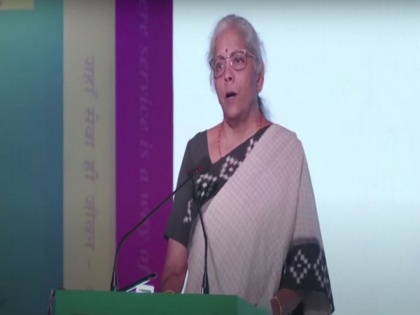Money was lent to "not-so-worthy" customers under UPA, resulting in NPAs: Nirmala Sitharaman
By ANI | Published: July 1, 2023 10:59 PM2023-07-01T22:59:05+5:302023-07-01T23:00:08+5:30
New Delhi [India], July 1 : Finance Minister Nirmala Sitharaman on Saturday said that during the tenure of the ...

Money was lent to "not-so-worthy" customers under UPA, resulting in NPAs: Nirmala Sitharaman
New Delhi [India], July 1 : Finance Minister Nirmala Sitharaman on Saturday said that during the tenure of the UPA government, priority in lending was given to "not-so-worthy" customers in an unprofessional manner resulting in Non-performing assets (NPA).
"Before our government came to power in 2014, difficulty in the Indian banking system actually started because of irrational 'Phone Banking' which happened during the tenure of the UPA government. Back then, the priority in lending was given to not-so-worthy customers in an unprofessional manner; as a result, they became NPAs," Finance Minister said while addressing the inauguration of the new Corporate Office of Punjab and Sindh Bank in New Delhi on Saturday.
She said that the Modi government followed a comprehensive approach to make sure that the Indian banking sector improved its performance and comes out of the difficulty. She said that the Insolvency and Bankruptcy Code (IBC) was introduced in 2016 to recover bad loans speedily.
"To protect the deposit of customers, Deposit Insurance cover was raised to Rs 5 lakh by the Modi Govt. National Asset Reconstruction Company Ltd (NARCL) was formed for asset reconstruction and recovery," Sitharaman added.
"As soon as we came to power under PM Modi's leadership in 2014, we realised that the banks were going through a crisis. Hence, we came up with a 4R formula. The 4 'R's are Recognition, Resolution, Recapitalisation, Reforms. Because of these '4Rs' and other reforms, banks are stable and posting good profits," Finance Minister said.
But she also advised that the banks should not sit back and revel in success. They should follow best corporate governance practices, adhere to regulatory norms, ensure prudent liquidity management and continue to focus on having robust asset-liability and risk management.
Banks should endeavour to adopt a proactive approach in reaching out to people in order to achieve optimum utilisation of financial inclusion schemes. There should be a focus on credit outreach in states where the credit offtake is lower than the national average, particularly in the NorthEast and eastern parts of the country, she advised further.
"Banks must aim to increase brick and mortar banking presence in border areas, particularly in those covered in the Vibrant Village Programme. Bank should also promote the Mahila Samman Bachat Patra announced in the Budget 2023-24 through special drives and campaigns. They must ensure that the entire Priority Sector Lending (PSL) target is met and not transferred to Rural Infrastructure Development Fund (RIDF)," she added.
"India's once troubled banks are now generating huge profits," she said quoting an international magazine. "Similarly, S&P has raised ratings of Indian Banks due to the improved performance of our banks," she added.
Net profits of the Public Sector Banks (PSBs) have almost tripled, increasing from Rs 36,270 crore in FY2014 to Rs 1.04 lakh crore in FY 2022-23, she informed.
"In 2014 when we came to power, we inherited the 'Twin-Balance Sheet Problem'. Under the Twin balance sheet, we talk about the balance sheet of the Banks and of the Corporates and the Ministry of Micro, Small and Medium Enterprises (MSMEs). When all these balance sheets are in trouble, the economy suffers which is what happened back then," she added.
She further added, "However, due to various reform measures adopted by the Govt, we're now having a 'Twin Balance Sheet Advantage'. Banks are now making good profits, their net worth has risen and they are also expanding their businesses. This benefits the economy."
"The Non-Performing Assets (NPAs) of the Indian banks is estimated to reduce further to a decadal low of 3.8 per cent by the end of FY 2023-24, Credit rating agency Crisil has stated," she added.
Nirmala Sitharaman was addressing the inauguration event of the new corporate office of the Punjab and Sindh Bank in New Delhi on Saturday.
Disclaimer: This post has been auto-published from an agency feed without any modifications to the text and has not been reviewed by an editor
Open in app